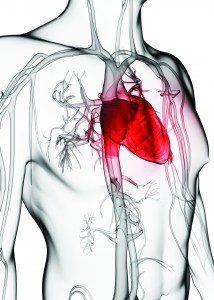By Jessica Babare D.O.
CardioVascular Solutions Institute


Heart attacks occur when the heart muscle is unable to receive adequate blood flow, depriving the muscle of needed oxygen and nutrients. This causes the heart muscle to be damaged and scarred, possibly leading to serious harm to the heart. This can cause death or serious disability, depending on the seriousness of the damage caused.
Most people who have a heart attack or heart related pain, called angina, will feel a discomfort in their chest area. Some people describe the feeling as a “pain,” but others describe it as a pressure or a heavy feeling. Some people feel the pain only in their chests, but others feel the pain elsewhere such as in their neck, jaw, shoulders, or arms. These other areas of pain may occur in addition to the chest discomfort or alone. Heart related symptoms often occur while a person is active, and get worse as the level of activity increases. If the symptoms occur at rest, they are most likely to worsen with activity.
Other common symptoms of heart attacks include difficulty breathing, especially with activity. Decreased energy, fatigue, and loss of stamina are also signs that the heart may not be getting good blood flow. Often, more vague symptoms go unrecognized, but are very serious, especially when accompanied by any other of the symptoms such as chest pain or shortness of breath. These symptoms include diaphoresis, which is a cold and clammy sweat, often occurring while a person is very ashy and pale. Some people may experience dizziness or nausea.
If you or someone you know ever experience these symptoms, you should take it very seriously. If the symptoms are mild and if they occur only briefly before going away, contact your doctor so that you can get proper medical attention and guidance. This could be a warning of more serious events to come. If the symptoms come on suddenly, are severe, and prevent you from doing your normal activity such as walking, you should stop what you are doing immediately and call 911. You may not have any time to lose.
If you are alone when the symptoms occur, get to a phone and rest, call 911 and follow the instructions of the 911 operator. They may instruct you to take an aspirin, but, if your symptoms are too severe, you should stay still and wait for EMS to arrive. The emergency personnel will be able to give you the aspirin when they get to you. If you are with someone, have them go get you an aspirin and help by calling the ambulance for you. Never drive yourself while having chest pains. This would not only put you at significant risk of danger, but would also endanger those sharing the road with you.
Many people can be successfully treated and survive their heart attack, but this very much depends on their ability to recognize the symptoms and to call for help as soon as possible. Unfortunately, many people never survive their first heart attack, dying before reaching the hospital, but by becoming aware of the signs and symptoms, you can recognize them and act quickly, saving your life or that of someone you love.
Symptoms of a Heart Attack
• Chest discomfort such as pain or pressure
• Difficulty breathing
• Pain in the jaw or neck
• Pain in the shoulders or arms
• Breaking out into a cold, clammy sweat
• Profound fatigue
• Nausea and/or vomiting
• Dizziness
• Passing out
• Any symptoms made worse by increased activity or movement
Jessica Babare, DO
Jessica Babare, DO, is board certified cardiologist who recently completed her training as an Interventional Cardiologist. In looking for a post-fellowship cardiology position, Jessica had a specific idea of the type of cardiology practice and colleagues she wanted to join, and has happily found that match with Dr. Gino Sedillo, Stacey Royce, PA-C, and the rest of the CardioVascular Solutions Institute team members.
Dr. Babare planned to attend the University of Illinois Medical School with an emphasis on training rural family practitioners. However, during the application and interview processes something drew her interest and attention to Nova Southeastern College of Osteopathic Medicine in Fort Lauderdale, a place where she could train to be an osteopathic physician. Osteopathic Medicine is a medical approach which emphasizes treating the “whole patient,” an approach to health care that Dr. Babare has found key to her success as a physician. She holds board certifications in Internal Medicine, General Cardiology, Integrative and Holistic Medicine, and is board eligible in Interventional Cardiology.
Becoming a highly skilled Interventional Cardiologist has long been one of Dr. Babare’s goals, and she is thrilled to have crossed this recent milestone. Dr. Babare believes the ability to adequately diagnose and treat patients with cardiovascular diseases begins with her own personal wellness. She uses meditation, voracious reading, a plant-based diet, yoga, and exercise to help accomplish this. She is a doctor whose truest desire is for every patient to be restored to his or her fullest potential for wellbeing.
Cardiovascular Solutions
Call To Schedule Your Appointment Today!
(941) 747-8789
www.cardiovascularsolutionsinstitute.com
 Southwest Florida's Health and Wellness Magazine Health and Wellness Articles
Southwest Florida's Health and Wellness Magazine Health and Wellness Articles

